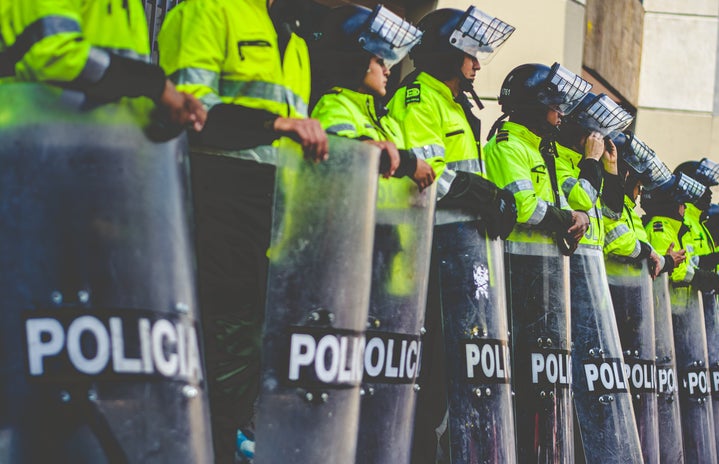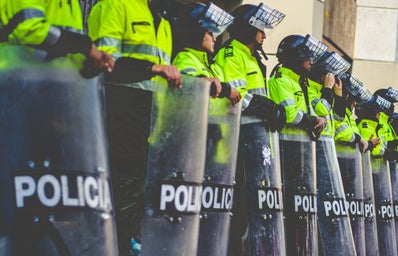The late July and early weeks of August of 2024 were defined by a wave of violent protests across the United Kingdom. Thousands of people marched through the streets of big cities like London, Liverpool and Manchester, all protesting against immigration laws and shouting racist-islamophobic chants. The acts were marked by vandalism of public buildings and direct confrontations with protesters and the police, who described the rallies as a “national critical incident”.
According to the investigations, the marches were triggered by misinformation on the brutal stabbing attack at a Taylor Swift themed dance event in Southport. The incident left three underage victims and eight injured. The 17-year-old British man responsible was detained by the authorities. On the internet, far-right groups leaked a false name and spread rumors about the nature of the attack, claiming it was orchestrated by a radical Islamic immigrant.
The clues lead to an extremist group called English Defence League (EDL) and Stephen Yaxley-Lennon, know as Tommy Robinson, an anti-immigrants and anti-muslim online activist that encourages hatred against refugees. The U.K.’s Metropolitan Police reported a riotous attack against asylum seekers’ shelters and the cities’ mosques. Hundreds of people were arrested for violent behavior and violation of the law.
the ultra conservative spree across europe
Well, the protests in England and Northern Ireland were just a few examples of what is happening across Europe right now. Countries like Portugal and Germany are also facing a new wave of hate against immigrants and a reactionary rising.
For the past years, we’ve been seeing the fast advance of conservative parties and right-wing extremism all around the world. The post-pandemic negationism opened doors for movements such as anti-science, anti-immigration and LGBTphobic acts – which have been normalized (and even encouraged) by this portion of the population.
A decline of the democratic spirit and the growing strength of extremist groups are concerning for the global landscape. In the last Brazil Forum UK, held at Oxford University, the president of the Brazilian Supreme Federal Court, Luís Roberto Barroso, highlighted that “democracy is undergoing a trial by fire with the rise of the far-right and the capture of religious sentiment”.
Populist and authoritarian movements gain strength from the discontent of populations facing social and cultural crises, which leads to a distrust in democratic institutions. We can see the emergence of nationalist ideals with the current immigration crisis in Europe – England received more than 18,4 thousand undocumented migrants just in August. Radical groups believe that these foreigners might damage the country’s economy and ruin the “European way of life” by expressing their own cultures. The former Prime Minister, Rishi Sunak, previously pledged to increase border enforcement and deport illegal immigrants to Rwanda.
Racist and xenophobic acts have become increasingly common across Europe, as we can see from the Vini Jr. case – the Brazilian football player, currently in Real Madrid, was a victim of racist abuse from Valencia supporters at Mestalla Stadium in 2023. Drawing on colonial legacies, certain segments of the European population invoke Darwinist ideas to justify claims of racial and cultural superiority, defending their historical and social dominance and perpetuating a sense of caucasian supremacy.
Neo-fascist ideals have gained ground not only within extremist groups, but also in presidential and parliamentary seats, as the fragility of liberal states creates space for radical ideas. With the Euro crisis, the radical left lost its dominance in the European Union, compounded by cuts in healthcare and education and the rise of private initiatives, which paved the way for the emergence of hard-right groups that expanded their space in the last elections for the European Parliament – a “thermometer” for the national politics.
rising tensions and responses to the hateful attacks
The abrupt surge of the ultra conservative acts emphasize the urge to unify leftist parties and progressive movements. Amid the violent protests in the United Kingdom, police officers and human rights advocates took to the streets to oppose the tide of hate. To address the escalation of extremist protests, the UK Prime Minister, Keir Starmer, established a “permanent force” of specialized police.
The protests were organized by Muslims, trade unions, anti-racism groups, leftist organizations and local residents, who outnumbered the ultra-conservative rally forming a human shield to protect asylum centers. In London, the march started in front of the building of the ultra-conservative political party, Reform UK.
On the other hand, the direct attacks on the Islamic community returned after another incident involving the american-singer, Taylor Swift. The blockbuster The Eras Tour had its shows canceled in Vienna due to an alleged planned terrorist attack. The cancellation of the three tour dates was announced on Instagram by Barracuda Music, the event organizer in Austria, following the government’s confirmation of the threat.
According to the investigations, the two detained suspects had direct links to Islamic State of Iraq and Syria (ISIS) and were “radicalized by the internet”. Explosive devices and detonators were found at the home of the 19-year-old who was supposed to be in the Ernst Happel Stadium. The case gave extremists the opportunity to launch renewed attacks against the Muslim community on social media.
__________
The article above was edited by Isadora Mangueira.
Liked this type of content? Check Her Campus Cásper Líbero home page for more!


